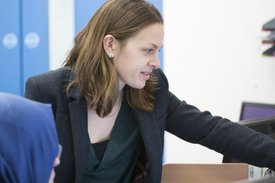
Dr Jennifer Bizley, Principal Investigator
Jenny set up her lab at UCL Ear Institute in 2011, as a UCL Excellence Fellow. She now holds a Sir Henry Dale Research fellow and is a Reader in Auditory Neuroscience. Previously she was a PhD student at the University of Oxford, working with Profs Andy King and Jan Schnupp, where she was also a post-doc and Royal Society Dorothy Hodgkin Research Fellow. Her main interest is in how the brain makes sense of the barrage of sensory information available to it. Her research focus is on the neural mechanisms of listening in noisy and complex - yet everyday - listening conditions. This includes understanding how visual information and attention enable us to listen effectively. While much of our work is centred on understanding auditory cortex we consider a number of other cortical areas including frontal and parietal cortex.
Jenny set up her lab at UCL Ear Institute in 2011, as a UCL Excellence Fellow. She now holds a Sir Henry Dale Research fellow and is a Reader in Auditory Neuroscience. Previously she was a PhD student at the University of Oxford, working with Profs Andy King and Jan Schnupp, where she was also a post-doc and Royal Society Dorothy Hodgkin Research Fellow. Her main interest is in how the brain makes sense of the barrage of sensory information available to it. Her research focus is on the neural mechanisms of listening in noisy and complex - yet everyday - listening conditions. This includes understanding how visual information and attention enable us to listen effectively. While much of our work is centred on understanding auditory cortex we consider a number of other cortical areas including frontal and parietal cortex.
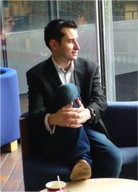
Dr Stephen Town, Senior Research Associate
Stephen's current research project explores the neural circuits that allow us to flexibly switch between sensory modalities. His ongoing projects involve exploring spatial co-ordinate frames in auditory cortex, and perceptual invariance.
Stephen's current research project explores the neural circuits that allow us to flexibly switch between sensory modalities. His ongoing projects involve exploring spatial co-ordinate frames in auditory cortex, and perceptual invariance.
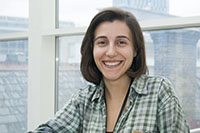
Dr Soraya Dunn, Post-Doctoral Research Associate
Soraya completed her PhD co-supervised by Jenny & Dr Daniel Bendor at the IBN, UCL and established the ferret as an animal model for studying the hippocampus. Most of our understanding of the hippocampus, an area essential for spatial navigation, comes from rodents who sense the environment through whisking and sniffing. Ferrets, like humans, rely predominantly on hearing and vision, and therefore make an interesting comparison species. She is now continuing this project using chronically implanted neuropixel probes to record spiking activity.
Soraya completed her PhD co-supervised by Jenny & Dr Daniel Bendor at the IBN, UCL and established the ferret as an animal model for studying the hippocampus. Most of our understanding of the hippocampus, an area essential for spatial navigation, comes from rodents who sense the environment through whisking and sniffing. Ferrets, like humans, rely predominantly on hearing and vision, and therefore make an interesting comparison species. She is now continuing this project using chronically implanted neuropixel probes to record spiking activity.
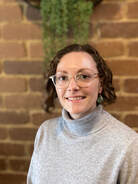
Dr Rebecca Norris Post-Doctoral Research Associate
Rebecca is looking at how auditory and visual cortices interact to link crossmodal information. She is investigating how silencing visual cortex impacts audiovisual processing in auditory cortex, and making simultaneous recordings in AC and VC to understand how visual information can shape auditory scene analysis.
Rebecca is looking at how auditory and visual cortices interact to link crossmodal information. She is investigating how silencing visual cortex impacts audiovisual processing in auditory cortex, and making simultaneous recordings in AC and VC to understand how visual information can shape auditory scene analysis.
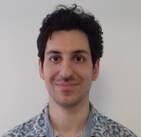
Dr Andrea Caso, Post-doctoral Research Associate
Andrea is a computational neuroscientist analysing neural recordings in Auditory Cortex made during the performance of an audio-visual rate discrimination task.
Andrea is a computational neuroscientist analysing neural recordings in Auditory Cortex made during the performance of an audio-visual rate discrimination task.
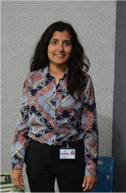
Bhavisha Parmar, PhD student
Bhavisha is co-supervised by Dr Debi Vickers and funded by the BRC. She is a qualified audiologist and spent 2017 as a sound seekers volunteer, establishing paediatric audiology services in Zambia. Her research project is to develop a spatial hearing test that mimics real-world listening in order to better assess hearing aid and cochlear implant fits.
Bhavisha is co-supervised by Dr Debi Vickers and funded by the BRC. She is a qualified audiologist and spent 2017 as a sound seekers volunteer, establishing paediatric audiology services in Zambia. Her research project is to develop a spatial hearing test that mimics real-world listening in order to better assess hearing aid and cochlear implant fits.

Katarina Poole, PhD Student
Kat is funded by the ERC. Her project is investigating the role of auditory cortex and auditory cortex-hippocampus interactions in the detection of regularity. She is combining multielectrode recording with optogenetic methods to observe and perturb neural activity during behaviour.
Kat is funded by the ERC. Her project is investigating the role of auditory cortex and auditory cortex-hippocampus interactions in the detection of regularity. She is combining multielectrode recording with optogenetic methods to observe and perturb neural activity during behaviour.
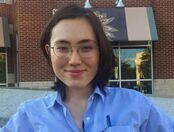
Carla Griffiths, PhD Student
Carla is funded by the ERC. Her project is investigating the role of auditory cortex and auditory cortex-hippocampus interactions in auditory stream formation. She is combining multi-electrode recordings during behaviour with computation methods to elucidate uncover neural signatures of feature to object-based representations.
Carla is funded by the ERC. Her project is investigating the role of auditory cortex and auditory cortex-hippocampus interactions in auditory stream formation. She is combining multi-electrode recordings during behaviour with computation methods to elucidate uncover neural signatures of feature to object-based representations.

Lida Alampounti, PhD Student
Lida is a BRC funded student developing clinical assessment tools for understanding how listeners exploit visual information when listening. She will be relating the ability of listeners to use visual cues to separate competing sounds to their ability to benefit from lip reading cues when listening in noise with the long term goal of provided targeted training to listeners who might benefit from improving their ability to exploit audiovisual integration.
Lida is a BRC funded student developing clinical assessment tools for understanding how listeners exploit visual information when listening. She will be relating the ability of listeners to use visual cues to separate competing sounds to their ability to benefit from lip reading cues when listening in noise with the long term goal of provided targeted training to listeners who might benefit from improving their ability to exploit audiovisual integration.
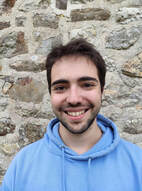
Jules Lebert, PhD student
Jules is an ERC funded PhD student working to understand how auditory perception is maintained in the presence of background noise and how auditory-prefrontal interactions support selective listening.
Jules is an ERC funded PhD student working to understand how auditory perception is maintained in the presence of background noise and how auditory-prefrontal interactions support selective listening.